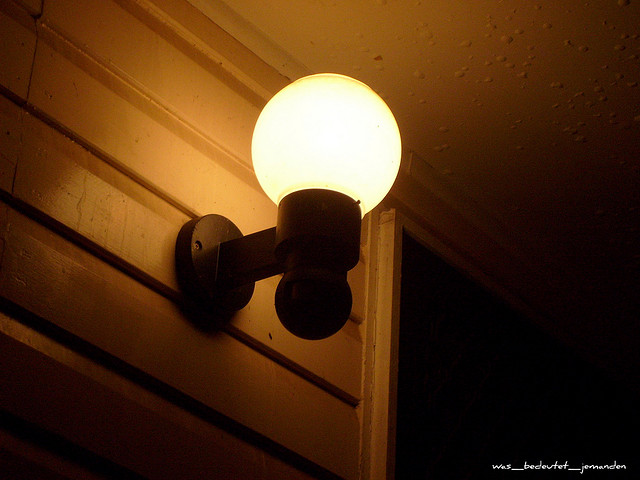The night that Casey Anthony was acquitted, my Facebook and Twitter feeds lit up with people raging against the perceived lack of justice that had been done by letting her go when most of the nation believed her to be guilty.
Statuses on my Facebook wall ranged from:
“Justice is in God’s hands only.”
to “Casey Anthony is free. God help her, because I wouldn’t.”
to “That bitch needs to get cut before she leaves the courthouse.”
What can I say? I have an eclectic set of friends.
By late afternoon a new kind of post was circling the web, an invitation to “Leave the light on for Caylee.” The idea was to turn your porch lights on that night and leave them on until the morning as a sign of love and support for the deceased, Caylee Anthony. Two million people RSVP’ed to a Facebook group, pledging to light up their porches for Caylee the night that her mother’s trial ended.
Now, I understand that people needed a constructive outlet for their rage and grief over something that the media had blown up in our faces for months, only to be dropped in a hot potato of disappointment. But then again, that’s just it. This wasn’t a constructive outlet. Running up electric bills for a few hours did nothing to help Caylee, or better yet to help children like her who live in abusive and perilous households. In fact, I think it hurt the cause of those living children instead of helping them. Here’s why.
Every time someone participates in an act of cyber-activism they are bolstering their own image as someone who cares, in their own mind and in the mind of others. It’s easy to believe that I’ve done something constructive when I say “Post this as your status for an hour if you know someone who’s been touched by cancer,” but in fact, all I’ve done is make myself feel like a person who does something to help a cause. Clicking “attend” on a pseudo-event where I promise to leave my porch light on just means I’ve cast myself in my friends’ eyes as someone who cares. I can go to bed at night sleeping easier thinking I’ve done something, when in fact I haven’t.
This feeling of doing good without having done anything at all is called slacktivism. I’ve done my bit in the virtual world, so I no longer feel burdened to actually help anyone. I won’t sign up to be a CASA court appointed advocate to help prevent other children from ending up like Caylee because I already left a light on. I won’t give money to cancer research because I’ve soothed my conscience. I’m an activist on screen so that I don’t have to make the effort to be one in real life.
October is breast cancer awareness month, where companies produce five dollar bags of pink M&M’s so that we’ll buy them and feel like we’ve helped the cause because of the fraction of a cent they send along to help research. On Facebook an annually annoying campaign has already begun: women posting cryptic statuses with innuendos that are supposed to somehow raise awareness about breast cancer. Two years ago the mysterious status posted was the color of their bra. Last year they posted the location of their purse in statements like: “I like it on the kitchen table.” That was a joy to see on the Facebook statuses of the teenagers I know.
This year’s innuendo status has women posting that they are pregnant and having cravings.


I agree that the Slacktivism is rampat and unneeded (in my opinion). But having said that, there are ways that I have used facebook and twitter for cyber activism that has really been helpful. Earlier today, I posted information about a charity and by voting for the founder it is possible that the charity could win $5,000 for a cause I believe in (clean water and the founder is now in third place). I also posted information about a need related to the Texas wildfires and one of my friends re-posted and a friend of theirs was able to help. I won’t even go into details of how helpful Facebook and twitter were when I found myself living through the violence of
the Arab Spring in Bahrain. All that said, I believe that one needs to
be selective about their cyber activism and realize when it might
actually help or when it might hurt one of their friends! I especially
disagree with this latest pretend pregnancy thing going around because it brings up painful memories for me! Thanks for asking! Stacy
Thanks for this great insight, Stacy. I agree that there are productive ways to use social media to point people to do good for great causes. The posts we’ve seen tonight about the wildfires, and the people responding to those needs, are a great example. Your posts about the wells donated in Josiah’s name have raised my awareness to that cause in a great way as well.
Don’t stop doing good on the internet because others are confused about how to do it. Keep showing them how it’s done!
Blessings,
Jessica
I remember a friend having the same basic thought about having a “Free Tibet” sticker on your car, guitar case, etc. It wasn’t that he was against freeing Tibet. His claim was that it was getting credit for caring about a situation while remaining far from the action, by default since 20-somethings in used sedans simply were in no position to actually do anything to advance freedom in Tibet. Plus, the audience for the sticker was just more people incredibly far removed from a place of taking action.
I think you’re basically right about slacktivism.
There’s such a fine line here, isn’t there? When I believe in a cause, I want other people to know about it. I want to put it out there for others to follow, but I want to act as well. One answer is to both act and tell the world that you’re acting, but then you can easily get into the whole “telling the right hand what the left hand is doing.”
I preached a couple of weeks ago on Jacob and talked about the difference between identity and image. I want the causes that I have empathy and compassion for to be part of my identity – not just an image I put out there for the world to see: “oh, she’s one of those cool people who wants to free Tibet.” I’d by lying if I said I didn’t cross that line sometimes.
Thanks for your comments, G!
~Jessica
you hit the nail on the head, Jess
awesome,,, and so correct. thank you
Jessica, today an older woman informed my husband that our niece was 4 weeks pregnant. He called me to find out if I had heard that news. I told him no. We uncovered the Facebook connection (my husband’s not on Facebook, but I am FB friends with both the woman & my niece.) I had a hard time explaining-over the phone-to my husband some of the goings on on Facebook so that he could explain it to the older woman. When he told her they were just trying to raise awareness for breast cancer she said, “Well, why don’t they just say that???” EXACTLY!
Additionally, I have several friends who are struggling with infertility & wonder how we women can be so insensitive to them.
I totally agree! Preach on sister! 🙂 I just love your blog. Keep on keeping it real.
Jessica, I too have really mixed feelings about this. I am one of those that has posted about the wildfires and asking for prayers, and for prayers about other things. I also post about Aggie stuff and occassionally about political stuff I feel strongly about. I never understood the whole breast cancer thing, I think it should be more straightforward. I did turn on my porch light for Caley Anthony but my reasoning was as a remembrance of a little child whose life was cut short and all the press talked about was her mother. I guess from my perspective I think words and actions should be done together. Whether it is to say it’s breast cancer awareness month and I just had my mammogram, or the ground is dry and the land is burning so please pray for rain. I have felt all along that FB and other social media can be beneficial if it is joined with action (just check the stats of how social media affected the last presidential election) and if it is straightforward.
Amen, Sister!
This just seems wrong to me. If someone spreads the word of a certain cause by Posting it to Facebook does not mean they are hurting the cause.
You may not have the funds to help out in any monetary value but posting it and spreading the word and awareness means something to someone. Maybe you have a friend that sees the link on your wall and decides that they have the funds to support it and help someone out.
Not everyone clicks a like button to bolster their image among Facebook friends. Some people truly care & or have gone through the death of a loved one via Cancer, AIDS, Child Abuse or any other disease/Cause that they are trying to raise awareness for.
Not all help can be a direct contribution to the cause but if it makes someone suffering or a family member of someone who has sufferd to smile it was worth it. All help is appreciated by someone somewhere no matter how much.
I couldn’t agree with you more. I think it falls, peripherally, into the larger category of “things we say on FB because we are sitting alone and want to vent but not aware of how many people we’ve exposed ourselves to and just what the consequence will be for it.”
Well, that explains why my sister posted about cravings and being 10 weeks. I can breathe a sigh of relief that she’s not breeding again!
Slacktivism is a bit of a pet hate of mine. “Oh but I’m raising awareness.” That’s great. You know what? We all know about cancer. If you don’t know cancer exists you were probably raised by sloths in the jungle. Never do any of these status updates suggest to women they should get a pap smear or a breast exam, never do they suggest a prostate exam for men. People don’t need to know cancer happens, they need to be told how to prevent it.
Every time someone on my friends list posts one of those cancer ‘awareness’ status updates I post a link to my Cancer Council fundraising page on it. No donations yet. Maybe one day…